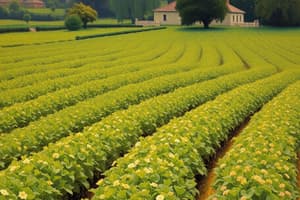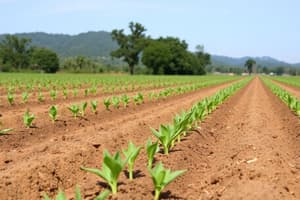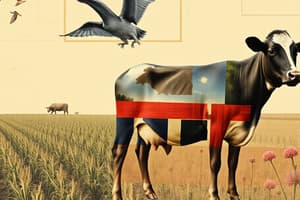Podcast
Questions and Answers
What factor does NOT influence crop production?
What factor does NOT influence crop production?
- Soil quality
- Water availability
- Pest and disease management
- Wind speed (correct)
Which of the following is a type of crop grown primarily for its commercial value?
Which of the following is a type of crop grown primarily for its commercial value?
- Wheat
- Potatoes
- Carrots
- Cotton (correct)
Which agricultural practice emphasizes the use of natural inputs and sustainability?
Which agricultural practice emphasizes the use of natural inputs and sustainability?
- Organic farming (correct)
- Hydroponics
- Conventional agriculture
- Precision agriculture
Which of the following is an example of a fiber crop?
Which of the following is an example of a fiber crop?
Which of these practices is NOT part of integrated pest management (IPM)?
Which of these practices is NOT part of integrated pest management (IPM)?
What is a primary challenge in crop production related to water?
What is a primary challenge in crop production related to water?
Which crop type is a source of vegetable oils?
Which crop type is a source of vegetable oils?
What agricultural technique focuses on optimizing inputs and yield through technology?
What agricultural technique focuses on optimizing inputs and yield through technology?
Flashcards are hidden until you start studying
Study Notes
Crop Production
-
Definition
- The process of growing crops for food, fiber, and other products used to sustain and enhance human life.
-
Types of Crops
- Food Crops
- Grains (wheat, rice, corn)
- Vegetables (carrots, potatoes, tomatoes)
- Fruits (apples, bananas, grapes)
- Cash Crops
- Crops grown for commercial value (cotton, tobacco, coffee)
- Fiber Crops
- Used for textiles and materials (cotton, flax)
- Oilseed Crops
- Source of vegetable oils (soybeans, canola)
- Food Crops
-
Factors Influencing Crop Production
- Climate
- Temperature, precipitation, and seasonal changes affect growth.
- Soil Quality
- Nutrient content, pH, texture, and drainage impact yield.
- Water Availability
- Irrigation and rainfall are crucial for crop health.
- Pest and Disease Management
- Integrated pest management (IPM) strategies are essential.
- Agricultural Practices
- Crop rotation, tillage, and cover cropping enhance soil health.
- Climate
-
Crop Production Techniques
- Conventional Agriculture
- Use of synthetic fertilizers and pesticides.
- Organic Farming
- Emphasis on natural inputs and sustainable practices.
- Precision Agriculture
- Technology-driven approaches for optimizing inputs and yields.
- Hydroponics and Aquaponics
- Soil-less growing systems for efficient resource use.
- Conventional Agriculture
-
Sustainability in Crop Production
- Focus on methods that preserve the environment and maintain productivity.
- Importance of biodiversity and ecosystem services.
- Practices like agroforestry and permaculture for ecological balance.
-
Global Trends
- Increasing demand for food due to population growth.
- Innovations in biotechnology for enhanced crop resilience.
- Climate change adaptation strategies in agriculture.
-
Challenges
- Land degradation and soil erosion.
- Water scarcity and inefficient irrigation practices.
- Economic barriers for smallholder farmers.
- Impact of climate variability on yield stability.
Crop Production Overview
- Crop production involves cultivating plants for food, fiber, and products essential for human life.
Types of Crops
- Food Crops
- Include grains (e.g., wheat, rice, corn), vegetables (e.g., carrots, potatoes, tomatoes), and fruits (e.g., apples, bananas, grapes).
- Cash Crops
- Grown primarily for commercial purposes, such as cotton, tobacco, and coffee.
- Fiber Crops
- Utilized for textiles and other materials, examples include cotton and flax.
- Oilseed Crops
- Produce vegetable oils; key examples are soybeans and canola.
Factors Influencing Crop Production
- Climate
- Temperature, precipitation, and seasonal patterns significantly affect crop growth.
- Soil Quality
- Factors like nutrient content, pH, texture, and drainage are critical for yield maximization.
- Water Availability
- Adequate irrigation and consistent rainfall are vital for maintaining crop health.
- Pest and Disease Management
- Integrated pest management (IPM) is crucial for protecting crops from pests and diseases.
- Agricultural Practices
- Techniques like crop rotation, tillage, and cover cropping improve soil health.
Crop Production Techniques
- Conventional Agriculture
- Involves the use of synthetic fertilizers and pesticides to enhance crop yields.
- Organic Farming
- Focuses on natural inputs and sustainable farming practices.
- Precision Agriculture
- Utilizes technology to optimize farming inputs and improve yield efficiency.
- Hydroponics and Aquaponics
- Methods of growing plants in soil-less systems, promoting more efficient resource use.
Sustainability in Crop Production
- Aims to maintain productivity while preserving environmental health.
- Highlights the importance of biodiversity and ecosystem services.
- Practices like agroforestry and permaculture promote ecological balance.
Global Trends
- Rising food demand due to increasing world population.
- Advancements in biotechnology contribute to crop resilience against environmental challenges.
- Implementing climate change adaptation strategies is essential for sustainable agriculture.
Challenges in Crop Production
- Land degradation and soil erosion threaten agricultural viability.
- Water scarcity and poor irrigation methods contribute to crop failure.
- Economic barriers complicate access for smallholder farmers.
- Climate variability poses risks to yield stability and food security.
Studying That Suits You
Use AI to generate personalized quizzes and flashcards to suit your learning preferences.




